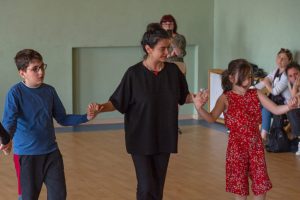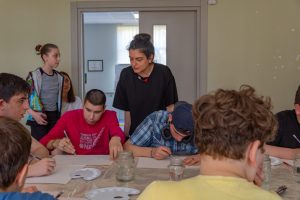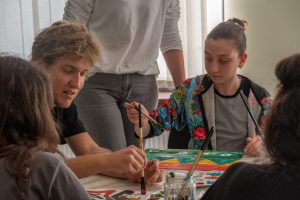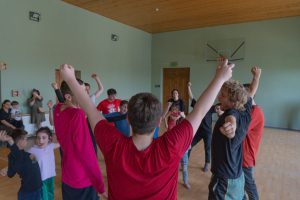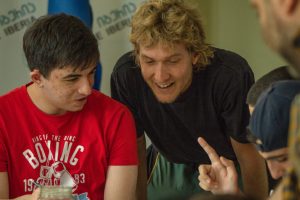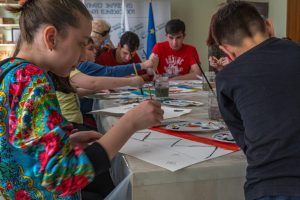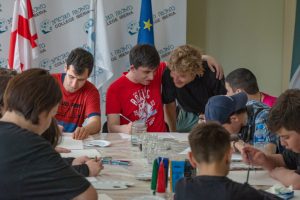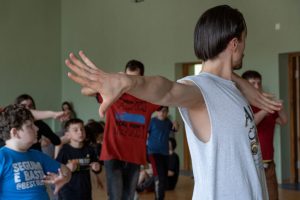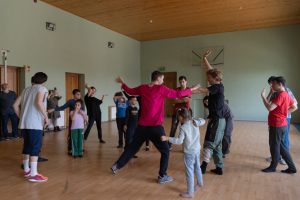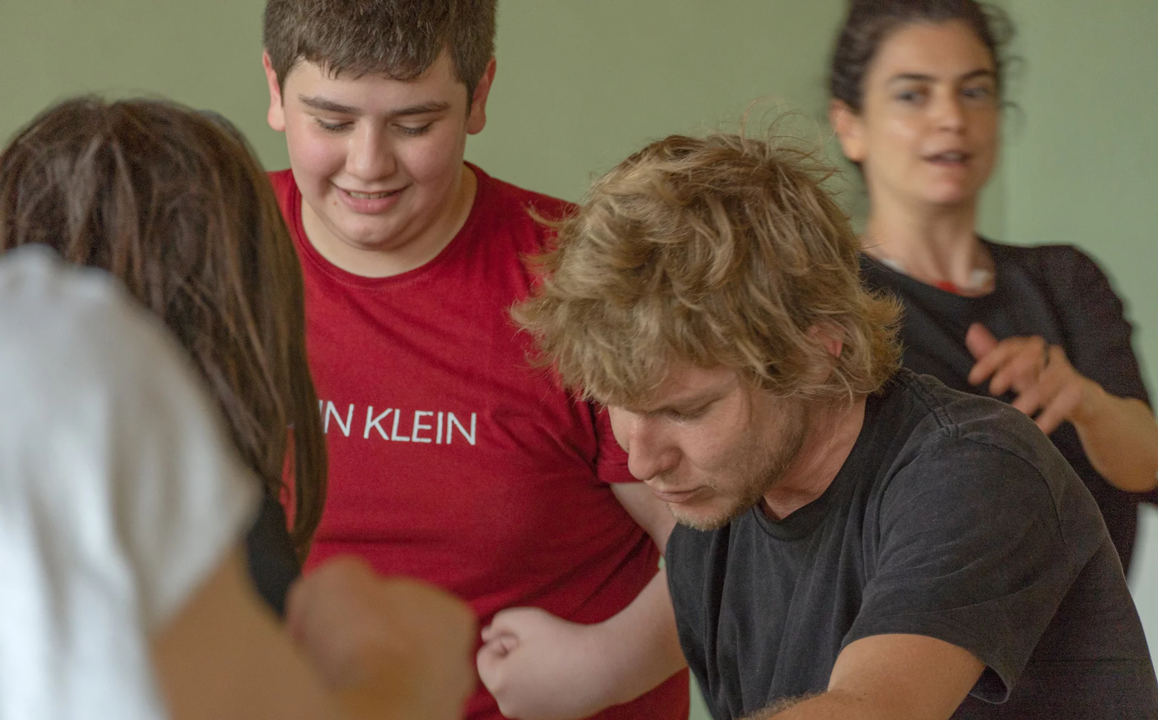
Dance, Move, Act: bringing inclusive art workshops to Kutaisi
Through the support of the EU under its EU4Culture project, a group of creatives and cultural professionals is popularising inclusivity in art on a local local level in Kutaisi, Georgia. Every week, children, adolescents, and youth with disabilities gather to learn contemporary dance techniques and enjoy each other’s company. They also get to engage with local artists and participate in workshops on painting, photography, and music.
“The main goal of the ‘Dance, Move, Act’ project is to create a precedent of initiating an inclusive art performance and creative process in Kutaisi,” says Maka Chkhaidze, Inclusive Arts Specialist, and the implementer of the EU-funded project.
Before initiating Dance, Move, Act, Maka pioneered inclusive dance workshops in Tbilisi, now managing an ensemble of seven persons with disabilities and seven professional performers. “With my two-year experience in the field, I have witnessed changing perceptions toward the conception of art and performance, which we create, diversifying the idea of what constitutes art,” Maka points out: “with our performance pieces, we challenge the notions of what can be done and seen on stage.”
This experience led Maka to realise that “there is a need for not centralising these processes in Tbilisi, but rather initiating them in regions as well.” Upon learning about the EU4Culture’s open call for Cultural and Cross-Innovation projects, she reached out to Timothe Audin, an inclusive dance specialist based in Kutaisi. Timothe has been mastering the art of dance since childhood and later combined it with behavioural therapy.
“The project Dance, Move, Act, started with Maka sending me an email and checking if I want to be on board with bringing inclusive art workshops to Kutaisi” says Timothe. This is how they started with designing and implementing the creative initiative, which “gives the joy of movement and art to the community in Kutaisi, where people with and without disabilities work together and realise that art is naturally a very inclusive subject.”
Dance and movement workshops
Every week, children with disabilities learn contemporary dance moves led by Timothe and other professional dancers. The sessions begin with warm-up exercises, followed by energetic dance movements both individually and with partners. With upbeat music in the background, hips swing, hands sway, feet jump, and the children’s bright faces light up the workshop spaces. Their parents are also present, watching the joy of dancing unfold.
Maka and Timothe are also conducting movement therapy, contact and contemporary dance workshops for psychotherapists, parents of children with disabilities, and professionals who work with these children. Hence, they are popularising and establishing inclusivity and dance therapy practices in Kutaisi, ensuring the impact of their project endures beyond its conclusion in the summer season of 2024.
Working toward a public performance in Kutaisi
The workshops are held with a specific end-goal in mind. “During the final stage, we will hold an inclusive dance performance with professional dancers and children with disabilities,” says Maka, “This is the culmination of the project.” In Summer 2024, the workshop participants and organisers will celebrate art and expression together, challenging the established notions in the cultural sphere.
“The stage is one of the best places for actualising the talent and resources of children with disabilities”, Maka notes, “audiences realise that these children can do many things in life, once they witness the performances on stage.” She also considers that performing on stage is an opportunity for self-expression for everyone.
Activating the local creative communities
In addition to the dance workshops, the Dance, Move, Act project team organises art classes for children with disabilities in Kutaisi. “We also wish to activate the artist community in Kutaisi to give workshops for these kids in different art forms such as music, photography, and painting,” says Timothe.
“We wanted to give the local artists in Kutaisi an opportunity of taking part in the inclusive work,” Maka points out, “with our assistance, they find out what inclusivity is and discover the potential that hides within the children with disabilities.”
As a result of the Dance, Move, Act team’s tireless efforts, the group of children attending the dance workshops are also learning about self-expression through other art forms. Acrylic paint, brushes, musical instruments, cameras, and other objects become tools for bringing their thoughts and ideas to life, guided by artists from Kutaisi.
Linkage with Kutaisi’s Cultural Development Strategy
In 2022, Kutaisi created its Cultural Development Strategy though the support of the EU, under its EU4Culture project. The municipality utilises this strategy to advance the local creative sector, with a strong emphasis on inclusivity.
“This is a city of incredible cultural traditions and experience,” Maka thinks. “Kutaisi’s Cultural Development Strategy supports the existing traditions and their development through integration of contemporary trends,” she says.
“Inclusive art is a trending topic in the global art scene where attention is focused on giving people with disabilities the opportunity to take part in the creative process,” Maka points out. “Inclusivity is one of the directions of [Kutaisi’s] strategy and this is how our project is connected to it.”
Art as a tool for self-expression and wellbeing
“There is no right and wrong in art,” says Timothe, “it is what it is – it exists.” He believes that expression is the core of art and people need this “to function through life and society”. He brings up the importance of letting thoughts out, he points out that “if you are unable to express yourself, it generates a lot of inner stress.” Therefore, he thinks, “any form of expression is important for wellbeing”.
With the art workshops of Dance, Move, Act, the team behind the initiative supports children with disabilities in doing just that – they express themselves in front of each other, their parents, and teachers. As part of the project finale, their talents will be showcased in front of the wider audiences as well.
Cultural and Cross-Innovation projects supported by EU4Culture
Dance, Move, Act is one of the four Cultural and Cross-Innovation projects supported by the EU4Culture project in Georgia. These creative initiatives are implemented by not-for-profit organisations in the regional cities of Kutaisi and Poti. Beyond the four projects in Georgia, EU4Culture has provided grants to 11 initiatives, which are implemented in non-capital cities of Armenia, Republic of Moldova, and Ukraine.
As in case of Dance, Move, Act, the EU-funded Cultural and Cross-Innovation projects are aligned with and catalysing the implementation of Cultural Development Strategies of the regional cities in these countries.
